A report on the operation of the Freedom of Information Act 2016 for 2020-21
Introduction from Acting ACT Ombudsman
I am pleased to introduce the 2020–21 annual report made under s 67 of the Freedom of Information Act 2016 (ACT) (FOI Act).
Transparency and openness instil confidence and trust in decision‑making and helps the community understand why difficult decisions are made. This year COVID-19 continued to present challenges which required us to adjust how we all work. COVID-19 and its impact on the ACT community highlights the importance of allowing access to government information during times of crisis. Now, more than ever, government decision-makers should ensure they are creating and maintaining records of their decisions and wherever possible, for that information to be available to the public.
This year, the Office of the ACT Ombudsman (the Office) continued working with agencies to share better practices and provide guidance on dealing with complex issues. I am pleased that in February the Office was able to host our first face-to-face FOI practitioners’ forum since 2019. It was a great opportunity for over 30 Information Officers and FOI staff from ACT government agencies to come together after a lengthy period working remotely during 2020.
Further, all 9 ACT government directorates provided both mandatory and optional data for our reporting, allowing us to build on our understanding of the operation of the FOI Act.
This year we completed 36 Ombudsman reviews. Nineteen decisions were published on our website and AustLII. Our total of 67 published decisions as of 30 June 2021, contribute to a growing body of precedent on the FOI Act and will guide practitioners in their future decision making.
During preparation of this report the former ACT Ombudsman, Michael Manthorpe PSM, announced his retirement effective 30 July 2021. I am confident we will continue working closely with directorates and agencies to improve consistent and timely decision-making, according to the pro-disclosure objectives of the FOI Act. The Office will focus on providing education and information about Open Access requirements, and guiding agencies to improve their compliance.
I would like to thank all of the staff in the Office of the ACT Ombudsman and our stakeholders in the ACT Government for their work to promote openness and transparency in government decision-making.
Penny McKay
Acting ACT Ombudsman
CONTENTS
- Part 1: INTRODUCTION
- Part 2: OPEN ACCESS INFORMATION DECISIONS
- Part 3: INFORMAL REQUESTS FOR INFORMATION
- Part 4: ACCESS APPLICATIONS
- Part 5: AMENDMENT OF PERSONAL INFORMATION
- Part 6: OMBUDSMAN REVIEWS
- Part 7: COMPLAINTS
- Part 8: THE YEAR IN REVIEW
- Part 9: THE YEAR AHEAD
- Part 10: GLOSSARY
Part 1: INTRODUCTION
This report outlines the ACT Ombudsman’s insights about the operation of the Freedom of Information Act 2016 (ACT) (FOI Act) in 2020–21, as well as planned priority activities for 2021–22.
The public’s right to access government information, underpinned by properly administered FOI legislation, is essential for the working of representative democracy. The FOI Act in the ACT has a pro‑disclosure bias and a focus on making government information accessible to the public.
Under the FOI Act every person has a right to access information held by the government, where it is not contrary to the public interest for that information to be disclosed.[1]
The FOI Act requires agencies and Ministers to proactively publish government information and be transparent about the information they do not publish. This includes information held by government directorates and agencies, ministers, government owned corporations (with some exceptions), public hospitals and health services, public authorities and public universities enacted under ACT laws.[2]
The FOI Act emphasises access to government information through informal requests without the need for formal processes. Where a formal process is required, an access application can be made under the FOI Act to the relevant agency and decisions are focused on public interest considerations.
The ACT Ombudsman oversees the FOI Act and promotes its objects by:
- conducting merits reviews of FOI decisions
- granting extensions of time to decide access applications
- monitoring the operation of the FOI Act including the publication of open access information by agencies and Ministers, and agency compliance with the FOI Act
- making open access information declarations
- publishing guidelines which are to be periodically revised
- investigating complaints about an agency or Ministers’ action in relation to their functions under the FOI Act.
Information about the Ombudsman’s FOI oversight role, as well as data required under s 96 of the FOI Act, is also included in the ACT Ombudsman’s 2020–21 Annual Report, which is available on our website.[3]
Part 2: OPEN ACCESS INFORMATION DECISIONS
The intention of the Freedom of Information Act 2016 (ACT) (FOI Act) is to make government-held information accessible. Formal access applications for information should be a last resort, with information being published proactively wherever possible.[4] ACT government agencies must routinely publish certain information without the need for a formal application to be made by a member of the public. This includes policy documents, reports, budget papers and agency disclosure logs.[5]
The ACT Government maintains an Open Access portal (act.gov.au/open-access) to provide the public with a central, searchable interface to access government information. Agencies can publish information on their own website and add a link to this information on the portal.
In June 2020, the Ombudsman finalised its Open Access Guidelines. These guidelines are notifiable instruments available on the ACT Legislation Register[6] and on the Ombudsman’s website.[7] The guidelines help ACT agencies to better understand and meet their Open Access obligations.
This year the Ombudsman continued monitoring ACT agencies’ compliance with their Open Access obligations under Part 4 of the FOI Act. Building on the agency self-assessments and desktop audits completed in early 2020, our Office provided general and targeted feedback to participating directorates and agencies.
As part of our monitoring process, the Ombudsman progressed the implementation of our own Open Access Strategy. This strategy is available online[8] and sets out:
- what information will be made publicly available
- how it will be made available
- how published information will be reviewed to ensure it remains accurate, up to date and complete
- that we will publish our reasons for decisions when information may not be made publicly available because it is contrary to public interest.
The strategy supports our staff to comply with Open Access requirements and may also be used as guidance for directorates and agencies to develop their own strategies.
Decisions to publish
During the reporting period, agencies and Ministers continued to publish Open Access information on their website and on the Open Access portal.
A total of 1,688 decisions to publish were made. This is an increase on the 1,430 decisions published in 2019–20, demonstrating agencies continue to take their Open Access obligations seriously and proactively publish Open Access information.
The Ombudsman recognises the above figures reflect agency decisions to publish information:
- on the agency disclosure log
- registered on the Open Access website
- on the agency
We recognise this may not capture all the information published by agencies. Agencies are not expected to keep formal records or make public interest assessments on the multitude of documents they publish on a daily or weekly basis. To require this would impose an unnecessary administrative burden and be inconsistent with the purpose of the FOI Act, discouraging agencies from publishing government information.
Decisions not to publish
Generally, if Open Access information is not made available because it is contrary to the public interest information, the FOI Act requires the directorate or agency to instead publish a description of the information and the reason for this nondisclosure, except in limited circumstances.
There has been a marked increase in decisions made to not publish Open Access information – with 83 decisions made in 2020–21, compared with 11 decisions made in 2019–20. This may be attributed to the development and maturity of directorates and agencies’ Open Access strategies, with directorates and agencies actively considering a wider range of information for publication before deciding not to publish some information.
In 2020–21, the number of decisions to not publish a description of the information at all remained steady with 11 decisions made in both 2020–21 and 2019–20.
It is unclear if these low numbers are due to directorates and agencies making few decisions not to publish Open Access information, or a failure to publish these decisions. We will explore this issue further in 2021–22 to ensure directorates and agencies are aware of their obligations and comply with the FOI Act.
Decisions by Directorates and Ministers
The Open Access decisions made by each of the directorates and agencies is outlined in Figure 1.[9]
The Office of the Legislative Assembly (OLA) made the highest number of decisions to publish Open Access information, with 487 decisions, followed by the Chief Minister, Treasury and Economic Development Directorate (CMTEDD), making 450 decisions to publish Open Access information.
Most directorates and agencies did not make any formal decisions to withhold information.
At 30 June 2021, a total of 39 decisions were made to publish Ministerial information, including 26 Ministerial diaries, 10 Ministerial travel reports, and 3 Ministerial hospitality reports during the reporting period. This is a decrease from the 63 decisions made in 2019–20, which may be attributed in part to the impact of COVID-19.
Figure 1: Open access decisions by directorates and agencies
Directorates and agencies | Decisions to publish Open Access information | Decisions not to publish Open Access information | Decisions not to publish a description of Open Access information |
|---|---|---|---|
Office of the Legislative Assembly | 487 | – | – |
Chief Minister, Treasury, and Economic Development Directorate | 450 | 76 | 3 |
Canberra Health Services | 248 | – | – |
Environment, Planning and Sustainable Development Directorate | 116 | – | 2 |
Justice and Community Safety Directorate | 85 | 1 | – |
Transport Canberra and City Services | 69 | – | – |
ACT Health Directorate | 52 | – | – |
Major Projects Canberra | 49 | – | – |
Suburban Land Agency | 41 | 1 | 1 |
Education Directorate | 33 | – | – |
Canberra Institute of Technology | 25 | – | – |
ACT Ombudsman | 20 | – | – |
ICON Water | 4 | – | – |
City Renewal Authority | 3 | – | – |
ACT Office of the Director of Public Prosecutions | 2 | 5 | 5 |
Commissioner for Sustainability and the Environment | 2 | – | – |
Teachers Quality Institute | 2 | – | – |
Part 3: INFORMAL REQUESTS FOR INFORMATION
Information can also be requested informally from an agency or Minister who may decide to release it directly, without the need for a formal access application.
Agencies are not required to report on informal requests received or related outcomes as to do so would impose an unnecessary administrative burden. Directorates and agencies reported that 130 formal access applications were withdrawn, and 52 access applications were resolved outside of the formal FOI process. The number of formal access applications withdrawn remains steady, compared with 123 formal access applications withdrawn in 2019–20. The figures for 2020–21 show a notable decrease in the number of access applications resolved informally, when compared with the 71 access applications resolved outside of the formal FOI process in 2019–20.
While we cannot ascertain if all the matters resolved informally were finalised after information was provided informally, it is positive to see applications are being resolved outside of the FOI process, as intended by the FOI Act. The Ombudsman encourages directorates and agencies to informally release information where possible, rather than requiring applicants to seek information through the FOI process. We will continue to monitor what is being reported by agencies to identify trends or issues.
Part 4: ACCESS APPLICATIONS
An access application is the formal way to request information under the FOI Act. Access applications can be made to an agency or Minister and may be reviewed by the Ombudsman. An agency or Minister will assess the application and may decide to give full or partial access to government information sought under the FOI Act or refuse access.
An agency or Minister can refuse access to information in circumstances where it is assessed as contrary to public interest information. They can also refuse to deal with an access application or refuse to confirm or deny that information is held subject to a range of reasons.[10]
Applications made
In 2020–21, 918 access applications were made to ACT government agencies which make up the 9 directorates as well as the smaller agencies.
As shown in Figure 2, this is a less than one per cent increase from the 912 access applications received in the 2019–20 financial year.
Figure 2: Access applications received by directorates
![]()
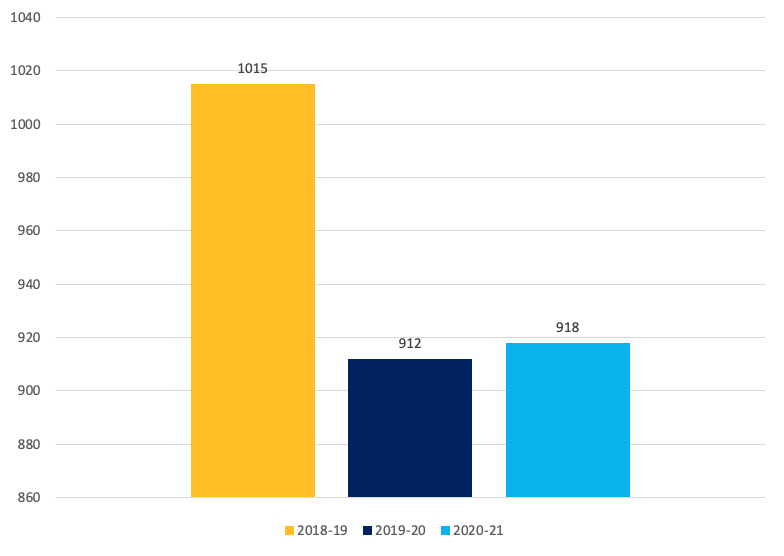
Figure 3 reflects the number of access applications received by directorates in 2019–20.
Figure 3: Access applications received by each directorate

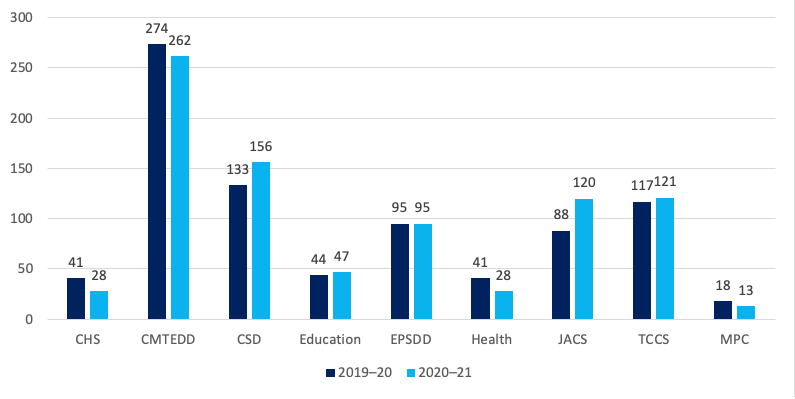
Application outcomes
During the reporting period 643 decisions were made on access applications by directorates and agencies. This is a 5 per cent decrease from the previous financial year when 676 applications were decided under the FOI Act.
As outlined at Figure 4, of the 643 decisions made on access applications, agencies reported:
- Full access was granted in 106 decisions (17 per cent) – with the agency disclosing all information identified within the scope of the access
- Partial access was granted in 366 decisions (57 per cent) – with some information redacted prior to the release because it was assessed as contrary to the public interest to disclose.
- Access was refused in 84 decisions (13 per cent) – with the agency deciding the information was contrary to the public interest.
- Information was assessed as not being held by the agency in 44 decisions (7 per cent) – with an agency expected to conduct all reasonable searches to locate the information requested prior to determining that it cannot be located or does not
- The agency refused to deal with the application or refused to confirm or deny that information was held in 43 decisions (7 per cent).
These figures show a decrease in the number of decisions to grant full access, with full access granted in
24 per cent of decisions in 2019–20, compared with 17 per cent in 2020–21. There was a corresponding increase in the number of decisions to refuse access in 2020–21 (13 per cent) as compared with 2019–20
(9 per cent). We will continue to monitor this issue.
The partial release of information remained steady at 57 per cent for both reporting periods.
Figure 4 excludes the 130 access applications that agencies reported were withdrawn by the applicant before a decision was made by the agency, and the 85 access applications that were reported as transferred from one agency to another to deal with. Figure 4 includes the 43 decisions where the agency refused to deal with the application or refused to confirm or deny that information was held. We did not report specifically on this category of decisions in 2019–20.
Our analysis of other jurisdictions in 2019–20 indicated applicants in Australia are more likely to be granted access in part than access in full, and this is a growing trend.[11] This is consistent with the ACT, with the percentage of full access granted in 2020–21 significantly less than the percentage of partial releases.
Agencies indicated these figures are disproportionately impacted when agencies make minor redactions of personal information (such as personal telephone numbers or other direct contact information). This results in the decision being classified as a partial release even if all the substantive information sought was in fact released. If this is the case, where the applicant agrees, agencies could improve their initial scoping activities with the applicant to ensure only the information they are seeking is included in the scope of the access application. To obtain a clearer picture of the number of access applications released in part versus in full, we are considering requesting additional data to distinguish where there is a partial release due to minor redactions to personal information as opposed to a partial release for other reasons.
The Ombudsman will continue to monitor this issue in 2021–22.
Figure 4: Outcomes of decided access applications

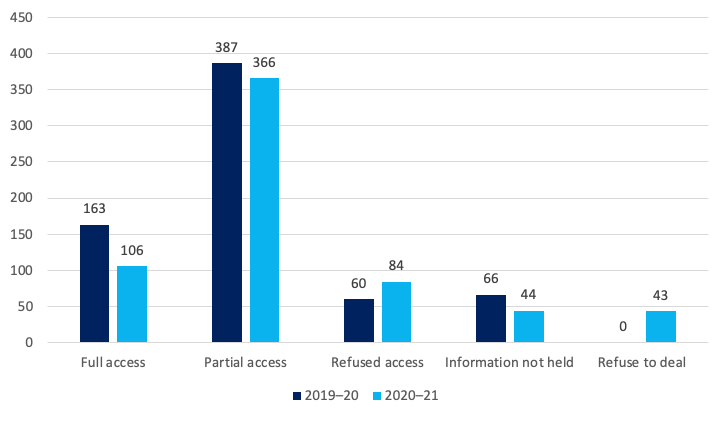
Reasons for refusal
In this reporting period all directorates provided data about the reasons they refused access to information in full or in part.
The top three factors relied on by agencies to withhold information under Schedule 1 of the FOI Act were:
- information disclosures prohibited by law in 59 decisions (31 per cent)
- information that is subject to legal professional privilege in 41 decisions (22 per cent)
- law enforcement and public safety information in 28 decisions (15 per cent).
This is consistent with the top three Schedule 1 factors relied upon by agencies in 2019–20.
The top three factors relied on by agencies to withhold information under Schedule 2 of the FOI Act were:
- prejudice the protection of an individual’s right to privacy or any other right under the Human Rights Act 2004 (ACT) in 345 decisions (58 per cent)
- prejudice trade secrets, business affairs or research of an agency or person in 76 decisions (13 per cent)
- prejudice an agency’s ability to gain confidential information in 49 decisions (8 per cent).
The top three Schedule 2 factors relied upon by agencies is consistent with the previous reporting period.
We will continue to monitor this data in future years to identify trends and compare with the factors that arise in decisions that are subject to Ombudsman review.
Processing times
Under the FOI Act, an access application must be decided within 20 working days, unless an extension of time is granted or a third party needs to be consulted. Where a third party is consulted, agencies have an additional 15 working days to decide the access application.
Extensions of time will apply where an agency or Minister requested further time from an applicant or the Ombudsman and the request is approved. Agencies can seek extensions of time for up to 12 months from the date of the application from the applicant. Any longer extensions must be sought from the Ombudsman. If an applicant refuses an extension request, the agency can also seek an extension from the Ombudsman.
Figure 5 below shows the average processing times, in working days, by each directorate that reported this data. Major Projects Canberra did not provide this data for the reporting period.
Figure 5: Average processing time by each directorate

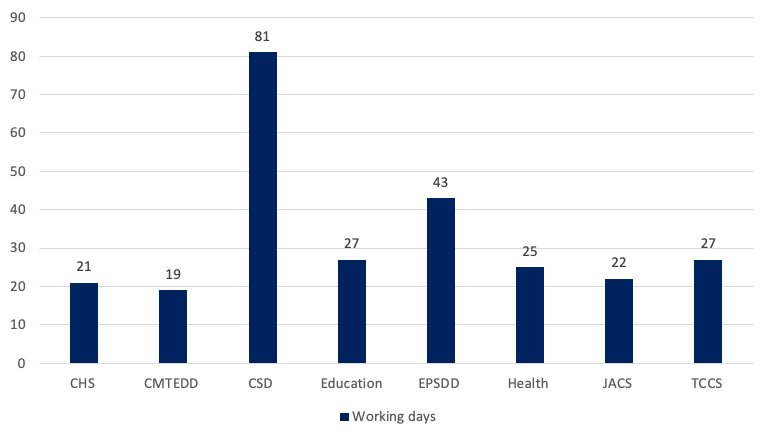
Access applications processed within time
During the reporting period, 97 per cent of decisions on access applications were decided within the statutory timeframes—that is, within the standard timeframe or where an extension was granted by the applicant or the Ombudsman.
Access applications decided without any extensions of time accounted for 77 per cent. A further
22 per cent of applications were processed where the applicant approved an extension request. Applications processed with an Ombudsman extension of time accounted for less than one per cent. The remaining 3 per cent of access applications became deemed refusal decisions and are discussed below.
There were 160 access applications ‘on hand’ at the end of the reporting period however the Ombudsman does not have visibility over the length of time these applications have been open.
Extensions of time by the Ombudsman
Following amendments to the FOI Act in 2019, the Ombudsman has greater discretion to grant an extension of time to an agency to decide an access application. An extension can be granted if the Ombudsman believes it is not reasonably possible for the access application to be dealt with within the timeframe, because the application:
- involves dealing with a large volume of information
- is complex, or
- other exceptional circumstances
The amendments to the FOI Act removed the cap on the length of time the Ombudsman can grant an extension and allows the Ombudsman to impose conditions to the extension granted. Once granted, the Ombudsman can cancel or amend the extension if the directorate does not comply with the conditions imposed
During the reporting period there were 11 applications made to the Ombudsman for an extension of time. The applications made by agency are shown in Figure 6.
Figure 6: Extension of time requests to the Ombudsman

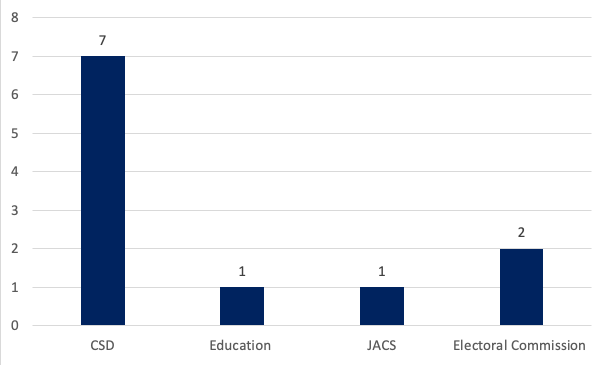
As shown in Figure 7, after assessing these requests the Ombudsman granted 8 requests and refused 2. One application was withdrawn before a decision was made. Of the applications granted, the Ombudsman imposed additional conditions on the 6 lengthy extensions. These conditions required incremental releases of information throughout the processing period.
The additional time requested and granted varied. The extensions granted to the ACT Electoral Commission were for 9 and 14 working days. The Community Services Directorate (CSD) requested much lengthier extensions, ranging from 146 to 452 working days.
The lengthier extensions requested by CSD reflect the complexity of the access applications received by the agency as well as the large volume of information access applications may relate to.
Figure 7: Extension of time outcomes

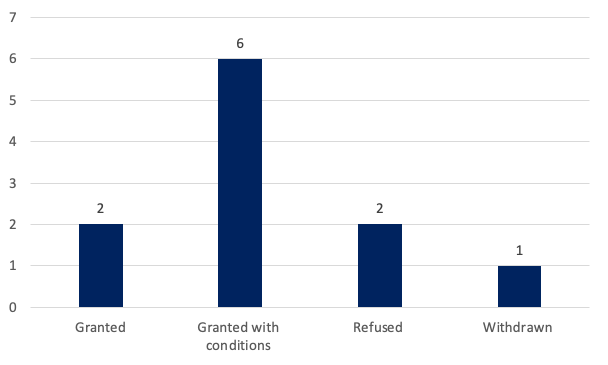
Deemed refusal decisions
Where the statutory timeframes are not met and an extension of time has not been obtained,
an agency or Minister’s decision is taken (deemed) to be a refusal to give access to the government information requested. Under the FOI Act, the Ombudsman must be notified of this deemed refusal and a copy of the notice tabled in the Legislative Assembly. This enables the applicant to apply for Ombudsman review.
As shown in Figure 8, during this reporting period the Ombudsman was notified of 19 decisions not made within time which were deemed to be refused by 5 directorates: CSD, TCCS, CMTEDD, Education and JACS. The agencies notified the Ombudsman and tabled a decision notice in the Legislative Assembly. This is a small decrease compared with 20 decisions notified to the Ombudsman in 2019–20.
Figure 8: Deemed refusal decisions

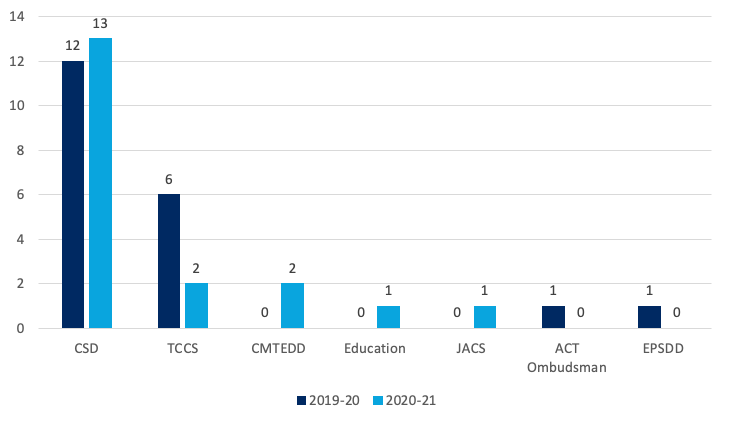
In 2019–20, we observed a significant discrepancy in the number of deemed refusal decisions reported by agencies (10),[12] compared with the number of deemed refusals notified to our Office (20) in the same reporting period. There was no such discrepancy this year, with the number of deemed refusal decisions reported by agencies matching the number of deemed refusals notified to our Office. While s 39 of the FOI Act does not provide clear timeframes on when the Ombudsman notification should occur, we consider it is best practice to complete this notification as soon as practical after a deemed refusal decision occurs, particularly as this is a reviewable decision.
Our published FOI Guidelines (ombudsman.act.gov.au/publications/foi-guidelines) provide details about these reporting requirements and draft templates for reporting to assist agencies.
Refusing to deal with access applications
Under s 43 of the FOI Act, agencies can refuse to deal with an access application in limited circumstances.
In 2020–21, 11 directorates reported they relied on this provision to refuse to deal with access applications: CHS, CMTEDD, CSD, DPP, Education, Health, JACS, Office of the Legislative Assembly, ACT Ombudsman, TCCS and University of Canberra. This is an increase on the 6 directorates that reported they relied on s 43 in 2019–20.
Figure 9 shows the reasons decision-makers decided not to deal with an access application, the most common being the information sought is taken to be contrary to the public interest to disclose under Schedule 1 of the FOI Act (56 per cent), followed by information that is already available to the applicant (22 per cent). Compared with 2019–20, there was an increase in the percentage of access applications refused on the basis the information sought is taken to be contrary to the public interest to disclose under Schedule 1 (52 per cent in 2019–20) and a slight decrease in the percentage of applications refused because the information was already available to the applicant (24 per cent in 2019–20).
Figure 9: Reasons for refusing to deal with an access application

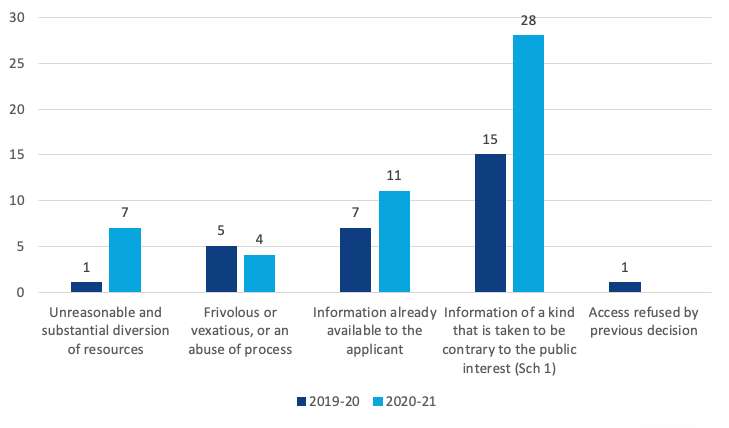
Fees
The objects of the FOI Act outline that access should be granted at the lowest reasonable cost to applicants. A fee may be charged when more than 50 pages of information are provided in response to an access application, except in certain circumstances – for example, where an access application for personal information about the applicant is made.
The fees that can be charged where considered appropriate are determined by the
Attorney-General and are outlined in the Freedom of Information (Fees) Determination 2018 (ACT).[13]
No fees for processing access applications received in 2020–21 were charged by any Minister or agency. This is a decrease from a single charge by an agency in 2019–20. The data is consistent with the pro-disclosure objects of the FOI Act, with cost not being an obstacle to access.
Part 5: AMENDMENT OF PERSONAL INFORMATION
If an individual has access to an ACT Government record or file or other government held information that contains their own personal information, and they believe their information is incomplete, incorrect, out of date or misleading, they can request this information be amended.
In this reporting period no formal applications were made to amend or annotate personal information under the Freedom of Information Act 2016 (ACT) (FOI Act). This is consistent with 2019–20, where no such formal applications were made.
We understand that ACT agencies generally manage such requests for amendment through other informal channels, rather than the FOI Act.
Part 6: OMBUDSMAN REVIEWS
The Ombudsman conducts independent merits reviews of decisions on access applications made by agencies and Ministers under the FOI Act. In reviewing a decision, the Ombudsman can confirm or vary the original decision or set it aside and substitute it with a new decision. Ombudsman review decisions are binding and may be appealed to the ACT Civil and Administrative Tribunal (ACAT).
Applications received
During the reporting period, the Office received 43 applications for Ombudsman review – 5 more than the 38 received in 2019–20.
Types of review applicants
Figure 10 shows the majority of Ombudsman review applications received in 2020–21 were made by members of the public (75 per cent), followed by the media (9 per cent) and private sector businesses (9 per cent).
The figures show some differences to 2019–20, where most Ombudsman review applications were made by members of the public (63 per cent), members of the Legislative Assembly (18 per cent) and private sector businesses (16 per cent).
Figure 10: Who applied for review

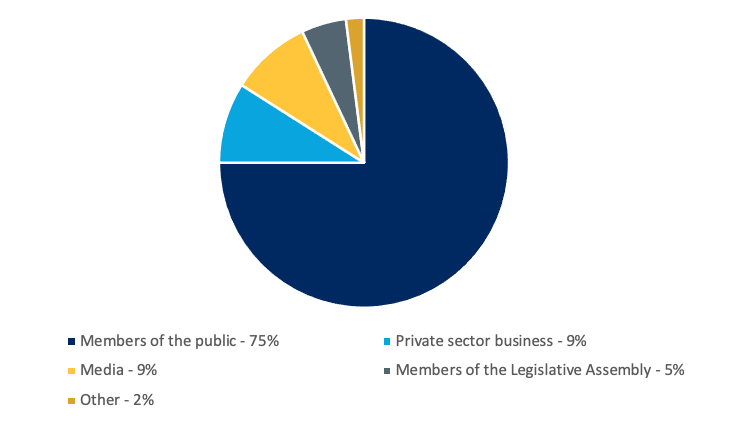
Reviews to date considered a variety of public interest factors including personal privacy, business affairs, Cabinet information and deliberative processes of government.
Agency participation in reviews
Figure 11 provides a breakdown of the review applications received by ACT agency for 2020–21, compared with 2019–20.
The numbers reflect that review applications increased for Health, JACS and CSD, but other agencies saw a reduction in reviews, including CMTEDD, TCCS and CHS.
Figure 11: Review applications by ACT agency

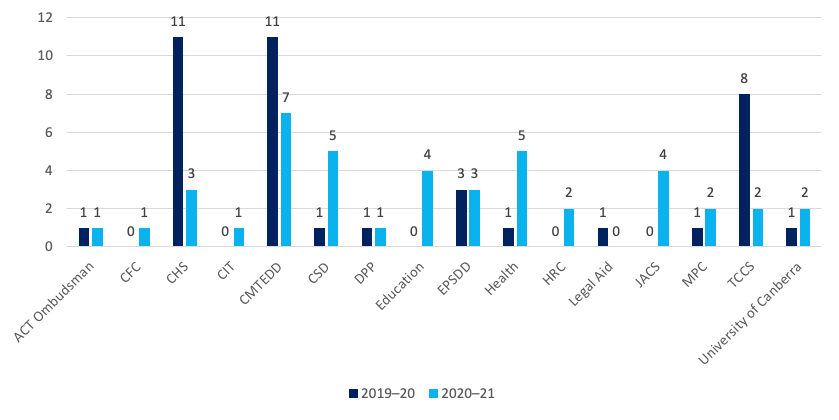
Applications finalised
During the reporting period 36 review matters were finalised:
- 5 were withdrawn following informal resolution processes
- 19 formal decisions were made
- 12 were closed with no review, of these:
- in 6 matters it was determined there was no reasonable prospect that the original decision would change
- the agency subsequently decided to release information in 2 matters
- 2 matters were determined to be invalid requests for review
- the applicant did not provide sufficient information in one matter
- the applicant did not make any further contact with our Office in one
These outcomes are explained below.
There was a significant difference in the number of review matters withdrawn in 2019–20 and 2020–21, with 10 matters withdrawn in the previous year and 5 withdrawn in the current reporting period. There was also a difference in the number of review matters in which the Ombudsman determined there was no reasonable prospect the original decision would change, with 4 matters closed in 2019–20 for this reason compared with 6 in 2020–21.
Closed with no review
Twelve review matters were closed by the Ombudsman with no reviews taking place. Under s 82(5) of the FOI Act, the Ombudsman may decide not to review a decision if:
- the applicant has not given our Office enough information to review the decision
- there is no reasonable prospect the original decision would be varied or set aside
- the agency or Minister makes a subsequent decision on the access application or otherwise resolves the application
- the Ombudsman is satisfied the review application is frivolous or vexatious or involves an abuse of process, or
- the Ombudsman is unable to contact the review applicant despite making reasonable efforts.
Informal resolution
Where possible, before proceeding to a formal decision, the Ombudsman seeks to resolve reviews through informal resolution.
This involves clarifying, and in some cases, refining the scope of an application for review and working with both parties to resolve the dispute. For example, if the applicant is focused on one particular document we may ask the agency for their view on the release of that particular document, rather than review the whole matter. Informal resolution assists the Ombudsman to provide a satisfactory outcome for review applicants in a timely manner.
Where cases are assessed as unlikely to result in a change of outcome we use case officer assessments to attempt to resolve matters before progressing to a final decision, by presenting the parties with information on the likely outcomes of the review and options for resolution. This approach reduces the overall timeframe for our reviews and saves the applicant additional legal fees where they have a legal representative.
Formal decision outcomes
From the commencement of the FOI Act on 1 January 2018 to 30 June 2021, a total of 67 Ombudsman review decisions have been published.[14] Nineteen reviews were published in 2020–21. These decisions provide agencies and applicants with guidance on the FOI Act including the application of the public interest test.
Of the 19 reviews finalised with a decision in 2020–21, the Ombudsman:
- confirmed the agency’s decision in 9 cases
- set the decision aside and substituted a new decision in 5 cases
- varied the decision in 5
Review timeframes
The FOI Act requires Ombudsman reviews be completed within 30 working days, however up to 30 additional working days is provided to undertake informal resolution of a review matter or if a matter is referred by the Ombudsman for mediation.
Our Office also has service standards for our review applications.[15] In 2020–21, of the 36 review matters that were finalised:
- 18 per cent were finalised within 6 weeks
- 52 per cent were finalised within 12 weeks
- 90 per cent of reviews were finalised within 6
While we aim to progress our reviews as quickly as possible, timeframes can vary, particularly when a matter is complex or involves several documents for assessment. Our timeframes can also extend if any of the parties seek additional time to make their submissions. In this reporting period we managed several review matters that involved a large amount of documents, dealt with uncommon and complex issues and concerned multiple parties, resulting in 10 per cent of our reviews taking longer than 6 months to finalise.
Case study An applicant lodged an Ombudsman review after the ACT Health Directorate refused access to various papers relating to the management of COVID-19 in another jurisdiction. The ACT Health Directorate refused access to all documents in scope, deciding that disclosure of the information would prejudice:
The Commonwealth and Victorian Departments of Health both provided submissions to support the decision of the ACT Health Directorate. The Ombudsman decided the documents could not be treated as inherently likely to prejudice intergovernmental relations and that different information and documents had to be considered on their merits. The Ombudsman accepted that some of the information was confidential and could reasonably be expected to prejudice intergovernmental relations but some of the information could not reasonably be expected to have this effect. The Ombudsman varied the original decision and gave access to some of the information at issue. |
Part 7: COMPLAINTS
The Ombudsman can investigate complaints about an agency or Minister’s functions under the FOI Act.
During this reporting period, the Office received 6 complaints relating to an agency’s functions under the FOI Act, a decrease from the 11 complaints received in 2019–20.
These complaints were about agencies’ actions performed under the FOI Act including the time taken to process access applications, potential conflicts of interest, decisions made by agencies and the narrowing of the scope of an access application.
Out of the 6 complaints, the Office decided to investigate one complaint. During our investigation the agency provided the complainant with a formal decision on their access application, resolving the complaint without any further action needed.
Part 8: THE YEAR IN REVIEW
Oversight agency activities
In addition to delivery on our statutory functions under the FOI Act, our Office undertook additional educational and engagement activities.
Open Access monitoring
In 2020–21, the Office continued working with agencies to monitor their compliance with Open Access
requirements. Following self-assessments by agencies and desktop audits by the Office, we wrote to all ACT agencies to report on our findings, provide individualised feedback, and highlight possible opportunities for improved practice. Our initial analysis of 23 agency self-assessments and our desktop audits of 9 Directorates found agencies are willing and well placed to meet their open access obligations.
The Office will continue its open access monitoring strategy in 2021–22 with a focus on agency education.
Ombudsman FOI practitioners’ forums
The Office usually conducts quarterly forums for ACT FOI practitioners to promote better practice in ACT government agencies. We hosted a face-to-face FOI practitioners’ forum in February 2021, with more than 30 Information Officers from agencies attending. The forum was an opportunity to reconnect with ACT agencies, share experiences with others and gain an insight into how the Ombudsman views the operation of the FOI Act and lessons learnt from our review work. It provided us with an opportunity to share our observations about the FOI Act’s implementation and facilitate discussion to help us identify challenges, opportunities and areas of capability development in the agencies we oversee.
The impact of COVID-19 limited our ability to conduct the quarterly forums. This meant we engaged with stakeholders in different ways in 2020–21. We circulated 3 newsletters to FOI practitioners in the ACT to replace the face-to-face forums. The newsletters provided updates on current events and trends, as well as tips for FOI practitioners dealing with access applications.
Engagement
To mark International Access to Information Day on 28 September 2020, we released a joint statement with Information Commissioners and Ombudsmen across Australia and New Zealand.[16] The joint statement stressed the importance of transparency and access to government held information during times of crisis.
In November 2020, the Deputy Ombudsman attended the biannual meeting of the Association of Information Access Commissioners with the ACT Ombudsman chairing the second meeting in June 2021.
Insights regarding agency decisions and behaviours
Following the third full year of the operation of the FOI Act, we can now make some observations on trends in FOI decision-making and agency compliance with the FOI Act. These observations are based on the data provided by directorates and agencies, our review function, as well as feedback from our engagement with ACT government agencies and the ACT community during the reporting period.
Open Access culture and reporting
This year we engaged further with agencies about their Open Access compliance, following the finalisation of our FOI guidelines, the self-assessments completed by agencies and the desktop audits completed by our Office in 2019–20. The data reported by agencies in 2020–21 indicates improved compliance with Open Access obligations, with an increasing number of decisions made to publish Open Access information.
We consider there is more work to do in promoting and supporting an Open Access culture in the ACT through education, and we intend to continue our practitioner’s forums in 2021–22 to support this.
Third party consultation
Similar to previous reporting periods, our FOI reviews are identifying some agencies are not meeting their third party consultation requirements under the FOI Act. There continues to be variances in how individual directorates and agencies carry out third party consultation.
This is not surprising as the legislative provisions about third party consultation are broad. Further clarification about this topic is provided in our guidelines dealing with access applications.[17]
We will continue to discuss better practice tips in our future newsletters and forums for practitioners to provide additional guidance on this topic.
Decision-making and the public interest balancing test
In 2020–21, we observed through our reviews further improvements in decisions prepared by agencies on access applications.
When agencies are deciding if information is contrary to the public interest to disclose, they must conduct a public interest test, set out in s 17 of the FOI Act. This test requires the decision-maker to identify all factors favouring disclosure, the factors favouring non-disclosure and conduct a balancing test to determine if information is in the public interest to disclose.
Most agencies are correctly identifying the relevant factors favouring non-disclosure when applying the public interest balancing test. However, these factors are not to be treated as outright exemptions. We frequently observe not all agencies are identifying all the factors favouring disclosure, or where they do, failing to weight them appropriately. This resulted in several review decisions which varied or set aside agency decisions because the balancing test was not performed with adequate emphasis on the pro-disclosure factors.
The Office will continue to work with agencies to improve FOI decision-making and the application of the public interest test in their decision notices.
FOI reviews about COVID-19 information
In 2020–21, some FOI reviews involved information provided to the ACT Government via the Australian Health Protection Principal Committee and National Cabinet.
These matters required the careful consideration of the issues and the balancing of sensitivities involved in intergovernmental relations against the public interest in transparency around the ACT Government’s administration of public health during COVID-19.
Part 9: THE YEAR AHEAD
The Ombudsman will continue to work with agencies and Ministers to encourage the proactive release of government information, according to the spirit and intention of the FOI Act objectives and to promote best practice in FOI decision-making.
One priority for the Office is to develop and use education tools, including forums and newsletters to complement the FOI guidelines to further support FOI practitioners in the ACT. Recognising that our quarterly forums may not be able to go ahead as normal due to COVID-19, we are considering alternate ways to hold these forums, either virtually or in smaller groups in 2021–22. We will also continue to circulate our FOI newsletter[18] to FOI practitioners.
Another focus will be to continue monitoring Open Access compliance in the ACT through education. Further, we will continue to:
- conduct reviews independently, efficiently and, wherever possible, informally resolve disputes
- promote best practice in our decision-making and case management during reviews
- raise awareness of the ACT community’s right to access government information and the Ombudsman’s oversight function
- engage with our interstate and Commonwealth counterparts to promote better practice and share information.
Part 10: GLOSSARY
Acronym | Agencies and directorates |
|---|---|
ACTO | ACT Ombudsman |
CFC | Cultural Facilities Corporation |
CHS | Canberra Health Services |
CIT | Canberra Institute of Technology |
CMTEDD | Chief Minister, Treasury and Economic Development Directorate |
CRA | City Renewal Authority |
CSD | Community Services Directorate |
DPP | ACT Office of the Director of Public Prosecutions |
EC | ACT Electoral Commission |
Education | ACT Education Directorate |
EPSDD | Environment, Planning and Sustainable Development Directorate |
Health | ACT Health |
HRC | ACT Human Rights Commission |
ICRC | Independent Competition and Regulatory Commission |
JACS | Justice and Community Safety Directorate |
LA | Legal Aid |
MPC | Major Projects Canberra |
OLA | Office of the Legislative Assembly |
S&E | Commissioner for Sustainability and the Environment |
SLA | Suburban Land Authority |
TCCS | Transport Canberra and City Services Directorate |
UC | University of Canberra |
References
[1] This is subject to some exceptions, such as information under the Health Records (Privacy and Access) Act 1997 (see s 12 of the FOI Act).
[2] The FOI Act includes a comprehensive definition of agency (s 15).
[3] See: https://www.ombudsman.act.gov.au/publications/reports/annual-reports
[4] See page 3 of the Explanatory Statement to the Freedom of Information Bill 2016 at https://www.legislation.act.gov.au/View/es/db_53834/20160505-63422/PDF/db_53834.PDF
[5] See s 23 of the FOI Act for the list of categories of open access information.
[6] See: https://www.legislation.act.gov.au/ni/2020-368/
[7] See: https://www.ombudsman.act.gov.au/publications/foi-guidelines/open-access-information-01
[8] See: https://www.ombudsman.act.gov.au/ data/assets/pdf_file/0014/111182/ACTO-Open-Access- Strategy-updated-July-2020.pdf
[9] This dataset includes information provided by each directorate, not including those in their portfolio. Separate data for each agency will be available in their respective annual reports.
[10] These being that the information is contrary to the public interest information and doing so would reasonably be expected to: endanger the life or physical safety of a person, be an unreasonable limitation on a person’s rights under the Human Rights Act 2004 (ACT), or significantly prejudice an ongoing criminal investigation. See s 35 of the FOI Act.
[11] See, for example, discussion by the NSW IPC in its Report on the Operation of the Government Information (Public Access) Act 2009 (NSW)| 2019-2020 at https://www.ipc.nsw.gov.au/sites/default/files/2021-07/Report_on_the_Operation_of_the_Government_Information_Public_Access_Act_2009_2019_2020_0.pdf
[12] Directorates are required to notify our Office when a decision is deemed at the time. Over the reporting period we were notified of 10, however in the data provided to our Office at the end of the reporting period there were 20 deemed decisions. This means Directorates did not notify us at the time and included this information in the end of year statistics.
[13] See: https://www.legislation.act.gov.au/di/2018-197/
[14] See: https://www.ombudsman.act.gov.au/improving-the-act/freedom-of-information/foi-review-decisions
[15] See: https://www.ombudsman.act.gov.au/improving-the-act/freedom-of-information/foi-complaints-and-reviews
[16] ACT Ombudsman, Joint statement on International Access to Information Day 2020 webpage, viewed 16 July 2021, https://www.ombudsman.act.gov.au/publications/media/2020/joint-statement-on-international-access-to-information-day-2020
[17] See: https://www.ombudsman.act.gov.au/publications/foi-guidelines/3.-ombudsman-guidelines- dealing-with-access-applications
[18] See: https://www.ombudsman.act.gov.au/news-and-events/news/first-act-foi-newsletter-released
